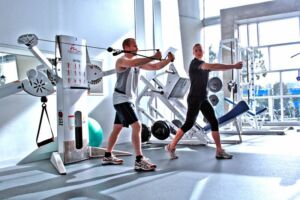News
Health authority recommends strength training for entire country
This article is more than 2 years old.
The use of weights is advocated not only for adults, but also for children

Fitness club visits would appear to be advised by new recommendations, unless you’re packing a multi-gym at home (photo: www.localfitness.com.au)
If you’ve been avoiding a gym membership because you figured cardio activity was sufficient, then think again, as the Sundhedsstyrelsen health authority contends that the use of weights should be a key component of the nation’s health.
Sundhedsstyrelsen will today publish new official guidelines strongly recommending regular strength training for everyone in Denmark, reports Jyllands-Posten. Twice a week is recommended for adults aged 18 to 64, 20 minutes each time, and three times a week for children and the over-65s.
As well as cardio, strength training incorporates weight training, so lifting weights, weight lifting and using other gym machines that specifically target muscle groups.
Strength training could alternatively just use the body’s own weight. Either are sufficient, according to Sundhedsstyrelsen.
Strongly advised for elderly
According to Sundhedsstyrelsen, the public are advised to use strength training to target the large muscle groups: primarily the legs, buns, stomach, back and arms.
The training is essential for strengthening the muscles, increasing muscle mass and making the bones stronger, contends the health authority.
Certainly, among the elderly, reduced mobility and ability to cope with physical challenges is caused because “the body grinds to a halt if the muscles disappear”, Martin Kreutzer, a nutrition economist formerly at the Department of Sports and Nutrition at the University of Copenhagen, told Jyllands-Posten.
Quite the turnaround
Kreutzer sounded a little surprised the recommendations have been made official, but he is an advocate.
“Until now, the official recommendations for exercise have almost exclusively been about circuit training,” he said.
“Now you are taking an important step and saying that strength training is also absolutely essential.”
Decades ago, strength training was not advocated for children, but there has been a change of attitude, provided they are supervised and do not lift weights too heavy for their physique.










































